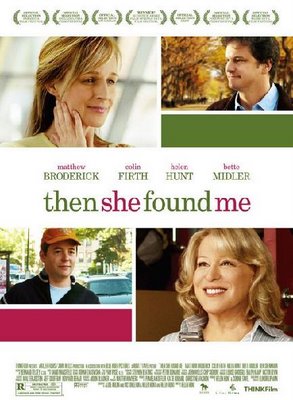
THEN SHE FOUND ME
US, 2007, 100 minutes, Colour.
Helen Hunt, Colin Firth, Bette Midler, Matthew Broderick, John Benjamin Hickey.
Cameos: Edie Falco, Jane Angorophilo, Tim Robbins.
Directed by Helen Hunt.
Helen Hunt has built up a solid reputation from the days when she was a child star. She has mastered television comedy in the series Mad About You. She has proven that she can act, especially ordinary and harassed women, by winning an Oscar and many awards for standing her ground with Jack Nicholson in As Good as it Gets. While recently looking after her child at home for several years, she worked on the screenplay for this film, adapting a novel by Eleanor Lipscomb, and developing the plot and adding characters. She also decided to direct.
This is the story of a middle-aged teacher, April, who knows that time is running out for her to become pregnant. At times, there is a great deal of humour, a lot of deadpan remarks and asides. At times, there is a great deal of pathos because life does not go the way we want it to go – there are regrets and disappointments. But, all the way through, Helen Hunt has made a humane film that takes on themes of marriage, separation, pregnancy, adoption, fertility treatment, love.
The film also has a pervasive Jewish background, not just because the characters are Jewish but there are prayers, rituals and ceremonies and questions about the existence of God.
Helen Hunt, looking quite gaunt and careworn, plays the teacher for sympathy but allowing the audience to be critical of her, even impatient with her. She marries a genial husband (Matthew Broderick) but he cannot deal with marriage and quickly leaves to go back to live with his mother. She encounters a divorced father who is trying to bring up his children and not let his bitterness overwhelm him (Colin Firth). It is not difficult to see where this is leading but some complications arise, especially with her ex-husband, that a happy ending does not necessarily seem likely.
April also tries fertility assistance (with a doctor played, of all people, by novelist Salman Rushdie). She does not want to adopt because she herself was adopted and felt that she was not as loved as her younger, naturally conceived, brother.
And, then she found me. Who is she? Bette Midler. A successful TV interviewer called Bernice, she bounces into April’s life, claiming to be her mother (and that Steve Mc Queen was her father – but she or the screenplay are not at all accurate about when Mc Queen made Bullitt, so the movie buff knows there is something wrong with the story). Bernice is an inveterate showbiz personality and cannot always be trusted with the truth. However, Midler does the shtick well, is funny in her bumptious way but also has some of the more serious sequences which she also plays very well.
In fact, this is quite a likeable film, genial while warts and all, does not pretend that life was meant to be easy but offers some insight as well as hope.
1.A woman’s drama: mid-life, marriage, pregnancy, adoption, love?
2.Helen Hunt and her contribution to the film: script, direction, performance?
3.New York City locations, homes, workplaces, suburbia, schools, television studios? Real? The musical score?
4.The Jewish background, God? Belief? Prayer, rituals, ceremonies, marriages, meals?
5.April at thirty-nine, a teacher, her way with the children, with staff? At home, her relationship with her brother? Her adoptive parents? Her mother’s attitude? The issue of adoption? Her feelings? Her brother and his being a confidant? Her relationship with Ben, love, marriage?
6.The portrait of the parents, adopting April, their love for Freddie? Her mother’s wry remarks, the wedding? Grandchildren? Her mother’s death? Her brother, his relationships, going to talk to him? His help?
7.Ben, his age, in love with April, the preparations for the marriage, the ceremony? At home, his casually mentioning that he wanted to leave, that he didn’t want to be married? Immature? His disappearance, going to his mother?
8.April and the consequences, at work, her meeting with Frank? Their talk, the children, sharing experiences? The outings, discussions, falling in love, April’s pregnancy? Ben, his making contact again, being with his mother, his declaration, the car sequence, April and her sense of betrayal of Frank?
9.Frank in himself, his children, his wife leaving, his bitterness? At school? The discussions with April, sharing the experiences? His manner, attractive, going out, the sexual encounter? His being upset and moving away?
10.Bernice, her claim, April and her willingness to meet her, at the restaurant, Bernice’s chatter, the television studio, April going to the studio, Allan and the staff, Allan and his following April? Bernice’s story? Her various stories?
11.Bernice in herself, her background, the past, the story about Steve McQueen? April watching his films? Sharing with April, the meals? Eventually giving her advice, the religious issues, Jewish? Her support, telling various versions of the story, on television, the reality and her career? Her success? Wanting her daughter?
12.April, the visits to the doctor, the miscarriage? The discussions about adoption? Her not being willing? The issue of fertility?
13.April as sad, Frank, meeting with him, the tension, the change?
14.The treatment, the interviews with the doctor, discussions with Bernice? Bernice and the discussions about prayer, belief in God, April’s prayer?
15.Adoption, the Chinese baby, the happy scene at the end, Frank and his children? Her being fulfilled?
16.A film of insight, its treatment of what it was to be a man, a woman?